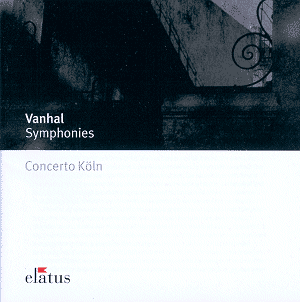Vanhal
was an important figure during the era in which Mozart rose to
prominence. Moreover the two knew one another and played quartets
together in Vienna during the 1780s. By then it is likely that
Vanhal had already composed the symphonies that are collected
on this disc. Three of them are known to have been composed during
particular years of the 1770s, while the others are likely also
to have been from that decade.
The
excellent and informative notes by Paul Bryan, who has also edited
the scores, put all these things into perspective. He begins by
reminding us that relatively little is known about Vanhal in comparison
with some of his more famous contemporaries. He made Vienna the
base for his career, although he hailed from Bohemia.
From
the stylistic point of view these symphonies (or sinfonias) are
rather typical of their time, and more particularly of the phenomenon
known as the ‘sturm und drang’. This represented an intensification
of expression and feeling into a musical style which was otherwise
more concerned with entertainment. There are several examples
of such an approach in the symphonies from the 1770s by Haydn
and Mozart, of course, and Vanhal too fits this mould.
In
short, this style brought forth a rhythmic and harmonic intensity
of expression, driving the music forward in faster movements,
adding feelings of pathos in slow movements. And Vanhal is a master
of the style. If there is a weakness, and it could be argued that
it is emphasized in these rather driven performances by Concert
Köln, it is that the structures are organised in two and
four bar phrases. This can result in what might be called a ‘chronic
short-windedness’, an intensity which is powerful in the short
term but perhaps results in a less than memorable larger-scale
experience.
Concerto
Köln perform skilfully and with a great sense of discipline
and teamwork. No leader or director is acknowledged, but that
does not imply a lack of direction and focus. If there is a criticism
it is that there might have been a higher priority given to poetry
at the expense of energy. However, without seeing the score or
comparing with alternative performances this is perhaps a harsh
verdict and not entirely fair. For these committed performances,
captured in excellent sound, serve Vanhal’s cause well and bring
his exciting music before a wider public.
Terry
Barfoot

